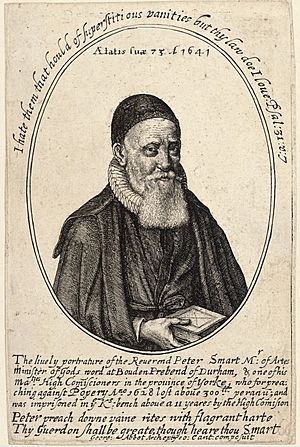Peter Smart facts for kids
Peter Smart (born around 1569, died possibly 1652) was an Anglican Puritan church leader. He was put in prison for 12 years because he spoke out against new changes to the church services at Durham Cathedral.
Contents
Early Life and Education
Peter Smart was born in Lighthorne, Warwickshire. His father, William Smart, was also a clergyman. Peter went to Westminster School, where he studied under teachers like Gabriel Goodman and Edward Grant. One of his classmates was Richard Neile.
In 1588, when he was 19, Peter began studying at Broadgates Hall, Oxford. Soon after, he earned a special scholarship at Christ Church, Oxford. While there, he wrote some poems in Latin. He earned his first degree (B.A.) in 1592 and his master's degree (M.A.) in 1595.
Church Career and Beliefs
In 1598, William James appointed Smart as the headmaster of Durham Grammar School. James later became the bishop of Durham. He ordained Smart as a priest and made him his personal chaplain. In 1609, Smart became the rector (head priest) of Boldon, co. Durham. He also received a prebend at Durham Cathedral, which meant he had a special position and income from the church. Before 1610, he also became the master of St. Edmund's Hospital, Gateshead.
In 1617, King James I visited Durham. Smart noticed that during the church service, there was no singing or organ music. The priests wore simple robes. This was important because Smart believed in a simpler style of worship, similar to the Puritan movement.
Speaking Out Against Changes
After 1617, Richard Neile became the new bishop of Durham. Bishop Neile started making changes to the church services at Durham Cathedral. He brought in more elaborate altars and fancy embroidered robes for the priests. Peter Smart did not agree with these changes. He felt they were too much like Catholic traditions, which Puritans disliked.
Smart stopped attending communion services at the cathedral because of these new practices. In 1628, he preached a sermon (a church speech) on July 27. In this sermon, he strongly criticized the new ceremonial changes. He called his sermon The Vanitie and Downefall of Superstitious Popish Ceremonies (The Emptiness and Downfall of Superstitious Catholic Ceremonies). It was published and became quite well-known.
Imprisonment and Release
Because of his sermon, church officials started legal action against Smart. John Cosin, one of Bishop Neile's chaplains, was a main target of Smart's sermon. Cosin was also one of the judges in Smart's case. On September 2, 1628, Smart was suspended from his church duties.
The case was moved to a higher court in London. Smart was held in custody, and copies of his sermon were publicly burned. Some important people, like Sir Henry Yelverton and Archbishop George Abbot, supported Smart's views on the ceremonies. However, Smart's strong words during the court hearings did not help his case.
In 1631, he was removed from his church position and fined. When he refused to pay the fine, he was sent to the King's Bench Prison. His friends helped him by raising money to support him and his family.
After nearly 12 years in prison, Smart sent a request to the Long Parliament in 1640 asking for his release. The Parliament agreed in 1641, saying his punishment was unfair. They also decided to take action against John Cosin. Smart wrote a book in 1641, accusing Cosin of "unseemly" (improper) words and actions. Another leader, Francis Rous, even called Smart a "Proto-Martyr" (an early martyr) for his cause.
After his release, Peter Smart got his church positions back. He continued to seek payment for the years he had been out of work. In 1643, he signed the Solemn League and Covenant, an agreement supporting Parliament during the English Civil War. He also gave evidence at the trial of Archbishop William Laud in 1644. He received new church positions in Bishopstoke, Hampshire, and Great Aycliffe, co. Durham.
Peter Smart was living in London in 1648. It is believed he died around 1652, possibly in a place called Baxterwood near Durham.
Works
Besides his famous sermon from 1628, Peter Smart also published other writings:
- The Humble Petition of Peter Smart, a poore Prisoner in the King's Bench, published around 1640. This was his plea from prison.
- A Short Treatise of Altars, Altar-fumiture, likely printed in 1641, but written earlier in 1628. This book discussed his views on church altars and furnishings.
- A Catalogue of Superstitious Innovations . . . Violations of the locall Statutes of Durham Cathedrall, published in 1642. This listed the changes he believed were wrong at Durham Cathedral.
- Septugenarii Senis iterantis Cantus Epithalamicus, published in 1643. This was a Latin poem dedicated to the Westminster Assembly, a group of religious leaders.
 | Janet Taylor Pickett |
 | Synthia Saint James |
 | Howardena Pindell |
 | Faith Ringgold |


